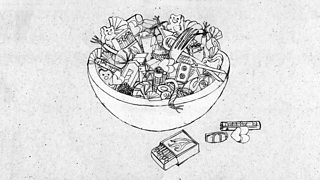What lies behind 'clickbait'
Clickbait, the seemingly endless and distracting content that dominates social media, is something we encounter every day. Much of it is made up of fast-paced and eye-catching videos that offer us apparently ingenious cooking, cleaning and health tips, and much more besides. Few of us probe or question the source of it, or the information that it imparts.
In The Digital Human episode, 5 Minutes, social psychologist Alex Krotoski looks at what lies behind these life hacks in terms of their wisdom and their unexpected origins, and uncovers more examples of social media manipulation along the way.
-
![]()
Listen to Digital Human: 5 Minutes
Aleks Krotoski explores how the mechanics of the digital environment allow misinformation to swamp digital platforms, and impact on users of all ages.
The clickbait recipe
Clickbait content creators just want you to watch, no matter the content. “They want us to stay focused for five minutes,” says Aleks, “so that they can get their ad revenue, and to do that they are using well-known influence techniques: provocative titles that will get us curious, pretty hands, pretty people, catchy music – none of this is deep psychological conversion, it’s all surface level stuff.”
Can clickbait be harmful?
A lot of clickbait life hacks are harmless – one example given in the programme is "how to cleanly slice a cake using dental floss and toothpicks". However, when Ashley Martin, a Public Health Advisor for RoSPA (Royal Society for the Prevention of Accidents) was consulted, he said that, in amongst various creative ideas, “every so often there is one that people shouldn’t be trying.” He references the lack of safety equipment and, using one particular example, using glue for a make-up hack – a guaranteed sticky end with the wrong type of glue in the wrong hands.
One compulsively popular YouTube channel is called 5-Minute Crafts. It’s a powerhouse for life hack videos, with – at the time of the broadcast – 66.9 million subscribers and 18 billion views. They were also the portal through which YouTube video maker and former Silicon Valley software engineer, Jarvis Johnson, found Bright Side, publisher of quizzes and features like “7 weird things about antelopes”. However, Bright Side also publishes, as Jarvis puts it, “a lot of very dark cartoons where death is featured very prominently, or riddles where the same thing is happening.”

Why anger goes viral
Dr Ryan Martin and Pankaj Mishra discuss the social role of anger.
-
![]()
The Digital Human
Aleks Krotoski explores the digital world

5-Minute Crafts, the Bright Side and TheSoul Publishing
Probing further, Jarvis found that Bright Side content, as with 5-Minute Crafts, was copyrighted to a company called TheSoul Publishing. Pumping out 1,500 videos a month. TheSoul was also on the radar of Lisa Kaplan, CEO of the Alethea Group which tackles social media manipulation.
“Originally called Ad Me, TheSoul Publishing (TSP) was founded in Kazan, Russia in 2004 before moving to Limassol, Cyprus and establishing US and UK entities in the summer of 2018,” Lisa explains. During this time, TSP went from relative obscurity to being the third biggest entertainment company after Disney and Comcast. While the overwhelming majority of its YouTube content is craft videos, there was a small amount of political content, including a video about Russian history narrated by a banana that praised Joseph Stalin as a “Russian Robin Hood”, among other examples of sanitising content. A media furore in the US followed, after which TSP removed what they admitted were “embarrassing” videos.
Canaries in the coalmine
TheSoul Publishing did not break the law, as Aleks points out, but she believes that they are “canaries in the coalmine for something more seriously wrong at the heart of the internet.”
‘Astroturfing’ is the name given to a centralised and organised campaign that pretends to be a genuine and popular online movement.
Lisa Kaplan further describes the internet’s problem as “multiple organised, well-funded players [be they state actors, political parties or other organised groups] playing games of digital chess, trying to reach you with information that will help them to further their goal… behave a certain way, buy a certain product, not vote in an election, or vote for a candidate that you wouldn’t normally vote for.”
Astroturfing – not a level playing field
Riffing on the idea of a "grassroots" movement, "astroturfing" is the name given to a centralised and organised campaign that pretends to be a genuine and popular online movement. Among manufacturers of such campaigns are the now infamous Internet Research Agency (IRA) based in St Petersburg, Russia, and the 50 Cent Party in China, both putting out posts and tweets designed to further the interest of their respective regimes and national groups (e.g. businesses). In the case of the IRA, it is claimed that they tried to influence the 2016 UK Referendum on the European Union in favour of Leave and the 2016 US Presidential election in favour of Trump. Franziska B. Keller, assistant professor at the Social Science Division of Hong Kong University of Science & Technology, says that sharing the same message can give the appearance of credibility, although some attempts will struggle to get out of their own echo chamber.

A Reopen and (eventually) shut case
A story from the US illustrates the kind of mania that social media manipulation can create around an issue – even if it is unmasked. Pro-gun groups were accused of astroturfing the activities of The Reopen America campaign to end the lockdown measures put in place because of the Coronavirus pandemic. While some domain names were being used by such groups, it was found that the vast majority were being bought up to stop their use for astroturfing. The purchaser, Michael Murphy, who describes himself as an “old hippie” was then on the receiving end of a "pile-on" from liberals via phone Twitter (where his contact details were posted) and email; he was also hacked. The back-firing venture cost him $4,000.
We have to become our own gatekeepers… we have to be critical consumers.
Lessons from history
The internet has allowed society to avoid gatekeepers. Now, as Alex Krotoski acknowledges, we have “crossed the Rubicon” to where there are so many voices that “we don’t know who to believe, so the loudest, the ones that manipulate the business models, are the ones that are heard.”
“We have to become our own gatekeepers… we have to be critical consumers. If we don’t, we will find ourselves in the same position we were in before the internet arrived – disempowered, side-lined and silenced.”
Explore the digital world on Radio 4
-
![]()
Download: The Digital Human
Aleks Krotoski explores the digital world.
-
![]()
Aleks Krotoski asks, are there some things that we'd be better off not knowing?
-
![]()
What do modern tribes look like?
Aleks Krotoski considers the concept of "tribe" in the modern world.
-
![]()
Three stories about the power of resistance
How digital tools can be reinvented in powerful ways by individuals seeking a better life.





